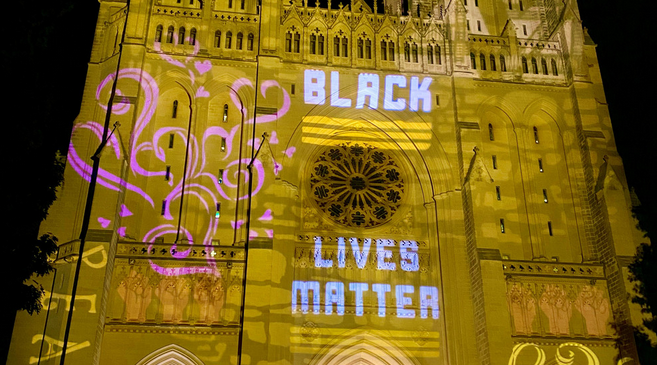Pulpit vs. Bully: The Preachers for Social Justice Arrayed Against Trump
It may say as much about Donald Trump as it does about God that some of his fiercest critics these days are leaders of faith.

Lisa Van Dusen/For the Hill Times
June 18, 2020
If Donald Trump were not worried about the supernatural status of some of his most potent opposition these days, surely he wouldn’t have stood in front of St. John’s Church on Lafayette Square on June 1 wagging a bible like some kind of medicine show huckster.
You don’t have to believe in a higher power to sense that what has been defining our daily experience lately—from the rampant political corruption disenfranchising citizens to the industrialized rubbish protecting that corruption to the devaluation of life on display in the pandemic mismanagement by Trump and his authoritarian cohorts to the commodification of lives and lying that defines Big Tech business models to the smug entitlement on the face of a white police officer as he extinguishes the life of a Black father and brother—is sufficiently akin to evil that I’m running out of less loaded, equally accurate ways of labeling it.
The last time America experienced such a vortex of political, social, and moral upheaval was during the 1960s, when the Civil Rights movement and the Vietnam War were punctuated by grotesque assassinations that turned the decade into a procession of veiled widows. Then as now, a mistrust of government had set in whose justification would not be clear until democracy had exposed it. Then as now, the churn of a racial reckoning demanded that power—individual, institutional, and political—take sides and inspired a joining of forces against the newly relevant fact that injustice anywhere is a threat to justice everywhere.
The voice who delivered that truth belonged to someone whose faith in something bigger than his own brand provided the perspective to counter white hatred from Bull Connor’s German shepherds to Edgar J. Hoover’s hounding surveillance. Rev. Martin Luther King Jr.’s social justice activism wasn’t placid, amenable, or deferential. Neither was the language he used to diagnose racism as not only a disease and a broken promise on the security of justice, but a leading indicator of deeper dysfunction.
Now, at Washington National Cathedral, overlooking the city as America’s unofficial church, “Black Lives Matter” nightly illuminates the neo-Gothic façade of the landmark where King delivered his last Sunday sermon, and where presidents Ronald Reagan and George H.W. Bush were eulogized by a Canadian, Brian Mulroney.
On Sunday, June 14, Rev. William Barber ended a stentorian guest sermon at the cathedral with, “America, why don’t you try mercy in your public policy? Why don’t you try love? Why don’t you try redemption? Why don’t you try grace? Why don’t you try truth? Why don’t you try that rather than trying revenge?” On June 2, Presiding Episcopal Bishop Michael Curry (you may remember him from Meghan and Harry’s wedding) said of Trump’s crowd-clearing bible photo-op, “You don’t read ‘blessed are the peacemakers’ then have tear gas fired on peaceful protesters.” The previous Sunday, Reverend Mariann Edgar Budde delivered an eloquent description of this as a “kairos moment” (Greek, meaning a propitious turning point): a chance to “help bring some good out of the nightmare we’ve been in, to wrench grace from unspeakable tragedy.” On the front line of grieving for George Floyd, the preacher who has shepherded far too many Black families through public mourning, Rev. Al Sharpton, channeled an indignant humanity, turning “Get your knee off our necks” into a chorus for justice. At the Vatican, Pope Francis called out both racism and hypocrisy, saying, “We cannot tolerate or turn a blind eye to racism and exclusion in any form and yet claim to defend the sacredness of every human life.”
Also recently, from a secular oracle of Omaha whose teachings may be more familiar to Mr. Trump: “Never, ever bet against America.”
Lisa Van Dusen is associate editor of Policy Magazine and a columnist for The Hill Times. She was Washington bureau chief for Sun Media, international writer for Peter Jennings at ABC News, and an editor at AP in New York and UPI in Washington.
